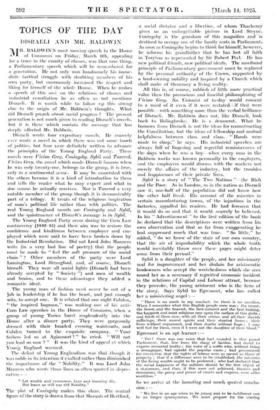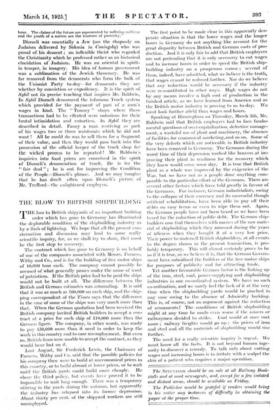TOPICS OF THE DAY
DISRAELI AND MR. BALDWIN
MR. BALDWIN'S most moving speech in the House of Commons on Friday, March 6th, appealing for a truce in the enmity of classes, was that rare thing, a Parliamentary speech which will be remembered for a generation. He not only won _handsomely his imme- diate tactical struggle with doubting members of his own party, but -enormously increased the respect and liking for himself of the whole House. When he makes a speech of this sort on the relations of classes and industrial- eonciliation he as often as not mentions Disraeli. 'It is worth while to follow up this strong clue to the origin of Mr. Baldwin's thoughts. What did Disraeli preach about social progress ? The present generation is not. much given to reading Disraeli's novels, but it is these which contain the message that has deeply affected Mr. Baldwin.
Disraeli wrote four expository novels. He scarcely ever wrote a novel in which • there was not some touch of polities, but four were definitely written to advance the principles of the Young England Party. These . novels were Vivian Crey, Coningsby, Sybil and Tancred. Vivian Grey, the novel which made Disraeli famous when he was only twenty-one,' belongs to -the group, it is true, only in a -sentimental sense. It -may -be associated with the others because it is a kind of introduction to them and tells the reader what he may expect and what in due course he actually receives. Nor is Tanered a very notable member of the- group though it is demonstrably part of a trilogy. It treats of the religious inspiration of man's political life rather than with politics. The real Young England novels are Coningsby and Sybil, and the -quintessence of Disraeli's Message" is in Sybil.
The Young England Party arose during the Corn Law controversy (1S42-45) and their aim was to restore the confidence and kindliness between employer and em- ployed which were said to have • been broken - down by the Industrial-Revolution. Did not Lord John 'Manners write (in a very bad `line of poetry) that the people must be made to " feel the soft pressure of the social chain " ? Other members of the party were Lord Lamiugton, Lord Strangford, and, Of course, Disraeli himself. They were all social lights .(Disraeli had been already accepted by " Society ") and men of wealth and brains, and -to these advantages they added a romantic ideal.
The young man of fashion need never be out of a lob in leadership if he has the heart, and just enough wits, to accept-one. It is related that one night Cobden, - " the inspired bagman," was making one of his anti- Corn Law speeches in the House of Commons, when a group of -young- Tories burst _resplendently into the House after a dinner party: They were gorgeously dressed with their braided evening waistcoats, and Cobden' turned to 'the exquisite company. " Your fathers lcd us at Agincourt? " he cried. " Will not you lead us now ? " -It was the kind of appeal at which - Young England- warmed. . . • - The defect of Young Englandism was_ that though. it - was noble in its intention it exalted rather than diminished the importance of the " Nobility." It was Lord John - Manners who Wrote those lines so often quoted in- depre- cation :- " Let wealth and commerce. INWS.and learning- die, But leave us still our old Nobility."
The plot of Coningsby makes this clear. The central figure -of the story is drawn from-that Marquis of-Hertford, - _a social . dictator and a libertine, of whom Thackeray gives us an unforgettable picture in Lord Steyne. COningsby . is "the grandson of this magnifico and is destined to occupy one of the family seats in Parliament. As soon as Coningsby begins to think for himself, however, he informs his grandfather that he has lost all faith in Toryism as represented by Sir Robert Peel. He has new political. friends, new political ideals. The Moribund principle of Parliamentary government must be replaced by the personal authority of the Crown, supported by a land-owning nobility and inspired by a Church which shall make of theocracy a living reality.
All this is, of course, rubbish of little more -practical value than the precocious and fanciful philosophizing of Vivian Grey. No Unionist of to-day would consent to a word of it even if it were restated --if that were possible—with something- more than the verbal brilliance of Disraeli. Mr. Baldwin does not, like Disraeli, look back to- Bolingbroke. He is a democrat. What he borrows from Disraeli is not the ideas- for reconstructing the Constitution, but the ideas of fellowship and mutual helpfulness between Class and class. " Hands were made, to clasp," he says. His industrial speeches arc always full of lingering and regretful reminiscences. of the days when he was a boy—when every man in the Baldwin works was -known personally to the employers, and the employers would discuss with the workers not merely the affairs of the industry, but the troubles and happinesses of their private lives.
Sybil is a story of. " The Two Nations "—the Rich and the Poor. As in London, so in the nation as Disraeli saw it, one-half of the population did not 'know how the other half lived. His account of the miseries in certain manufacturing towns, of the injustices in the factories, appalled his readers. He had foreseen that it would do so and that it would scarcely be believed. In his " Advertisement " to the first edition Of -the- book he declared that the descriptions were written from his own observation and that so far from exaggerating he had suppressed much that was true. "So -little," he added, " do we know of the state of our own country, that the air of improbability which the whole truth would inevitably throw over these pages might deter some -from their perusal."
Sybil is a daughter of the people,- and her missionary zeal for improVement and her disdain for aristocratic landowners who accept the wretchedness which she sees round her as a necessary if regretted economic incident in :the relations of Capital and Labour attract, because they provoke, the - young aristocrat who is the hero Of the story. Says Sybil to Egreniont, who has called her -a ministering angel :— - " There is no merit in my conduct, for there is no sacrifice, When I remember What this English people once was ; the truest, the freest, and-the bravest, the beet-natured and the best-looking, the happiest and most religious race upon the surface of this globe ; and think of 'them now, with all -their crimes and all their slavish sufferings, their soared spirits and their stunted forms ;' their lives without enjoyment, and their deaths without hope ; I may well feel for them, even if 1 were not the daughter of their blood."
Egremont is an apt learner :- " Yes ! there was one voice that had sounded in that proud Parliament; that, free from the slang of faction, had dared- to express immortal truths ; the voice of a noble who, without being a demagogue, had -upheld the popular -cause ; had pronounced - -his conviction-that- the Tights of labeur -wore-as-sacred as-those 'of property ; that if a difference were to be established, the interests of the living wealth ought to he preferred ; who had declared that the social happiness of the millions should be the first object of a statesman, and that; if this were not achieved; thrones and dominions, the pomp and power of courts and empires, were alike worthless."
So we arrive at the haunting and much quoted conclu- sion :— " We live in an age when to be young and to be indifferent can be no longer synonymous. We must prepare for -the coming hour. The claims of the future are represented by suffering millions and the youth of a nation are the trustees of posterity."
Disraeli was essentially a Jew (see the rhapsody on Judaism delivered by Sidonia in Coningsby) who was proud of his. descent ; an inflexible theist who regarded the Christianity which he professed rather as an historical elucidation of Judaism. He was an oriental in spirit, in temper, in imagery. His idea of human government was a sublimation of the Jewish theocracy. He was far removed from. the democrats who form the bulk of the Unionist Party to-day—for democrats they are whether by conviction or expediency. It is the spirit of Sybil not its precise teaching that inspires Mr. Baldwin. In Sybil Disraeli denounced the infamous Truck system which provided for the payment of part of a man's wages in kind. The " Tommy " shops where these transactions had to be effected were notorious for flick brutal intimidation and extortion. In Sybil they are described in detail. Fancy a man receiving as part of his wages two or three waistcoats which he did not want ! All he could' do was to sell them for a fragment of their value, and then they would pass back into the possession of the official keeper of the truck shop for the wicked process to be repeated ! Mr. Baldwin's inquiries into food prices are. conceived in the spirit of Disraeli's denunciation of truck. He is for the ".fair deal " ; he is out for improving the Condition of the People—Disraeli's phrase. And we may imagine that he has dwelt often upon Disraeli's picture of Mr. Traffordthe enlightened employer.















































 Previous page
Previous page